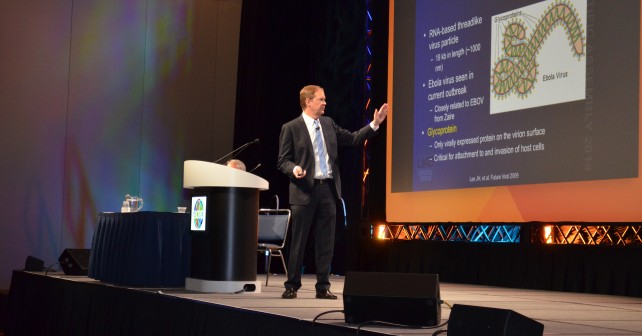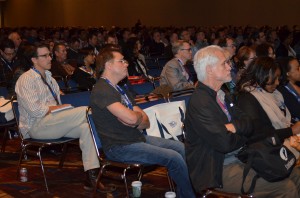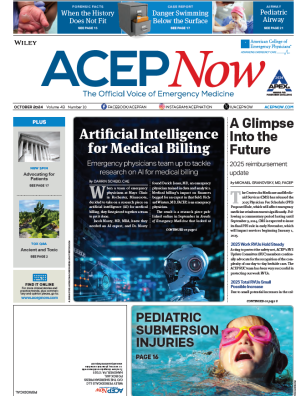
CHICAGO—In the midst of national hysteria over Ebola virus disease, emergency physicians can be their institutions’ voice of reason on who is at risk of contagion, an expert said Tuesday at a packed ACEP14 session.
Explore This Issue
ACEP14 Daily News Wednesday: Vol 33 - No10C - October 2014“I’m preaching to the choir,” said David Pigott, MD, RDMS, FACEP, emergency medicine professor at UAB School of Medicine in Birmingham, Ala., who co-led the program, “Ebola: Hemorrhagic Fever and the U.S. Experience.”
“You guys are emergency physicians. You’ve read the warnings. You’ve read the guidelines,” he added. “But it stands to reason that people in your hospital may not have. Maybe your hospital administrators haven’t. Maybe your nursing staff [and] your ancillary staff hasn’t read those recommendations…your job is going to be to take this message from here to say, ‘This is not how the virus is transmitted. We have clear evidence of how it is transmitted.”
Dr. Pigott and co-presenter Alexander Isakov, MD, MPH, of Emory University in Atlanta, laid out much of what emergency medicine and the CDC knows about Ebola so far:
- It’s not airborne;
- Asymptomatic patients are not contagious;
- Supervised personal protection equipment (PPE) doffing and disinfection is advisable (the same goes for ambulances and transport vehicles);
- Strict infection control standards help prevent exposure to bodily fluids that transmit the virus; and
- Transmission risk increases with illness severity.
Dr. Isakov, executive director of Emory’s Office of Critical Event Preparedness and Response (CEPAR), said that more education and training for emergency physicians, first-responders, and others would improve the U.S. response. He also noted that while there are the first cases in the U.S., the outbreak in West Africa is the worst in the 40-year history of the disease, so containing and treating it there should be a priority.

But the crucial first step in U.S. emergency departments is to understand Ebola, its pathogenesis, its treatment, and approaching it properly.
“Getting your head around it is a big part of being comfortable in the work environment,” Dr. Isakov said. “Think about us in our early careers, just learning our skills in managing patients in the ED. It took us a few years through residency, maybe a couple years after, to get comfortable in our work environment.
“Well, for Ebola virus disease there’s a discomfort level. It’s really through this education and training that we close that discomfort level, erase those anxieties, and close the gap of knowledge.”
Richard Quinn is a freelance writer in New Jersey.
Pages: 1 2 | Single Page



No Responses to “Emergency Physicians Can Be “Voice of Reason” in Ebola Outbreak”